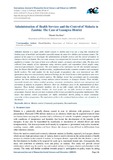Please use this identifier to cite or link to this item:
https://space.mu.ac.zm/xmlui/handle/123456789/199Full metadata record
| DC Field | Value | Language |
|---|---|---|
| dc.contributor.author | Siachisa, Musole | - |
| dc.date.accessioned | 2021-10-08T08:20:34Z | - |
| dc.date.available | 2021-10-08T08:20:34Z | - |
| dc.date.issued | 2020-02 | - |
| dc.identifier.issn | ISSN 2349-0373 | - |
| dc.identifier.uri | https://space.mu.ac.zm/xmlui/handle/123456789/199 | - |
| dc.description.abstract | Malaria is a major public health concern in Zambia and it has for a long time remained the leading cause of morbidity and mortality especially among the under five children and pregnant women. The purpose of this paper is to investigate the administration of health services and the control of malaria in Luangwa district, in Zambia. The case study strategy was adopted and the research was both quantitative and qualitative in nature. Two types of data were collected, namely, secondary and primary data. The data were collected from samples of key informants using interview guides and respondents (local people) using structured questionnaires respectively. The total number of key informants was 46 who included managers from the District Health Office, health providers, neighbourhood health committee members and community health workers. The total number for the local people (respondents) who were interviewed was 200. Quantitative data were analysed using Statistical Package for the Social Sciences while qualitative data were analysed using the method of content analysis.The findings reveal that government and its cooperating partners has been implementing various malaria control measures in Luangwa District.These include; insecticide-treated nets, indoor residual spraying, community sensitisation, malaria case management and prevention of malaria in pregnancy. However, there are challenges faced in the implementation of these measures. These include community members who do not fully comply with the measures which are implemented to control malaria. Further, the local people are not fully involved in malaria control programmes. Instead, they are just mere recipients of the services provided by programme implementers. This means that malaria control programmes are highly centralised, thereby failing to ensure community ownership these programmes. The implication of this is the continued high prevalence rate of malaria in the district. | en_US |
| dc.language.iso | en | en_US |
| dc.relation.ispartofseries | International Journal of Humanities Social Sciences and Education (IJHSSE);Volume 7, Issue 2, February 2020 | - |
| dc.subject | Malaria, Malaria control, Community participation, Decentralisation | en_US |
| dc.title | Administration of Health Services and the Control of Malaria in Zambia: The Case of Luangwa District | en_US |
| dc.type | Article | en_US |
| Appears in Collections: | Political science | |
Files in This Item:
| File | Description | Size | Format | |
|---|---|---|---|---|
| JOURNAL_ARTICLE_PUBLISHED(1).pdf | 508.88 kB | Adobe PDF |  View/Open |
Items in DSpace are protected by copyright, with all rights reserved, unless otherwise indicated.
